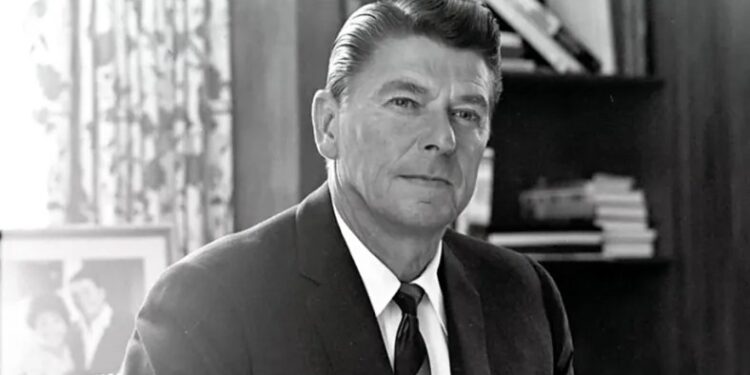Ronald Wilson Reagan, the 40th President of the United States, left an indelible mark on American history through his charismatic leadership, unwavering commitment to conservative principles, and his role in ending the Cold War. Born on February 6, 1911, in Tampico, Illinois, Reagan’s journey from a small-town upbringing to Hollywood actor and eventually to the pinnacle of political power is a testament to the American dream.
Reagan’s early life was marked by modesty and perseverance. Raised in an economically challenging environment, he developed a strong work ethic and a belief in the virtues of individual responsibility. These values became the bedrock of his political ideology. Reagan’s foray into show business, first as a radio sports announcer and later as a film actor, catapulted him into the public eye, setting the stage for his eventual transition into politics.
In the 1960s, Reagan emerged as a prominent political figure, initially as the two-term governor of California. His tenure as governor showcased his commitment to fiscal conservatism and a no-nonsense approach to governance. It laid the foundation for his successful run for the presidency in 1980.
Reagan’s presidential campaign centered on a promise to restore American greatness by championing conservative principles. His famous line, “Government is not the solution to our problem; government is the problem,” encapsulated his belief in limited government intervention and a free-market economy. Upon assuming office in 1981, Reagan set out to implement his vision through a series of economic policies known as Reaganomics.
Reaganomics aimed to stimulate economic growth by cutting taxes, reducing government spending, and deregulating industries. The results were mixed, but Reagan’s supporters credit his policies with fostering a decade of economic expansion. Critics argue that the benefits disproportionately favored the wealthy and increased income inequality.
Beyond domestic policy, Reagan’s presidency is perhaps best remembered for his role in ending the Cold War. His firm stance against the Soviet Union and the implementation of a robust military buildup signaled a departure from the policy of détente. The Strategic Defense Initiative (SDI), a missile defense system proposed by Reagan, added pressure on the Soviet economy and contributed to the eventual collapse of the Soviet Union.
Reagan’s leadership style was characterized by optimism, affability, and effective communication. His speeches, such as the famous “Tear down this wall” address at the Brandenburg Gate in Berlin, showcased his ability to convey a compelling vision for a free and prosperous world.
However, Reagan’s presidency was not without controversy. The Iran-Contra affair, in which senior officials secretly facilitated the sale of arms to Iran, raised ethical questions and tarnished his administration’s reputation. Despite this setback, Reagan’s popularity remained resilient, and he left office in 1989 with high approval ratings.
Ronald Reagan’s legacy endures as a symbol of conservative values, economic policies, and strong leadership. His impact on shaping the Republican Party’s modern identity and his role in the global political landscape during the Cold War era solidify his place as a transformative figure in American history. Whether admired for his unwavering convictions or critiqued for the consequences of his policies, Reagan’s imprint on the nation remains unmistakable.
newshub



Recent Comments